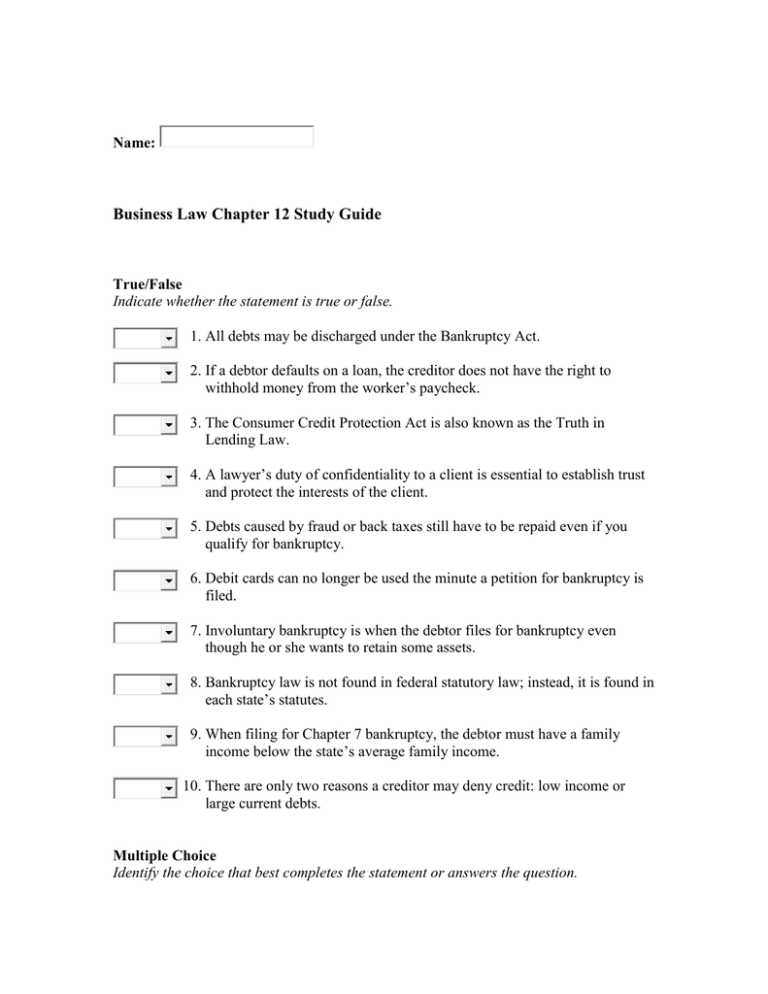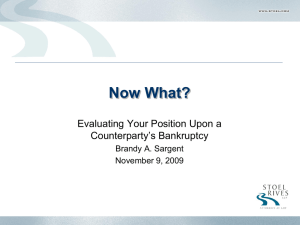Business Law Chapter 12 Study Guide
advertisement

Name: Business Law Chapter 12 Study Guide True/False Indicate whether the statement is true or false. 1. All debts may be discharged under the Bankruptcy Act. 2. If a debtor defaults on a loan, the creditor does not have the right to withhold money from the worker’s paycheck. 3. The Consumer Credit Protection Act is also known as the Truth in Lending Law. 4. A lawyer’s duty of confidentiality to a client is essential to establish trust and protect the interests of the client. 5. Debts caused by fraud or back taxes still have to be repaid even if you qualify for bankruptcy. 6. Debit cards can no longer be used the minute a petition for bankruptcy is filed. 7. Involuntary bankruptcy is when the debtor files for bankruptcy even though he or she wants to retain some assets. 8. Bankruptcy law is not found in federal statutory law; instead, it is found in each state’s statutes. 9. When filing for Chapter 7 bankruptcy, the debtor must have a family income below the state’s average family income. 10. There are only two reasons a creditor may deny credit: low income or large current debts. Multiple Choice Identify the choice that best completes the statement or answers the question. 11. If you believe an error has been made on your credit card bill, how long do you have to notify the creditor from the date of the credit card statement? a. one week c. 30 days b. 60 days d. 90 days 12. To assist consumers who receive bills for charges they dispute, Congress passed the a. Fair Credit Billing Act. c. Fair Credit Reporting Act. b. Fair Debt Collection Practices d. Disputed Charges Reform Act. Act. 13. The Fair Debt Collection Practices Act makes it illegal for a. creditors to report you as being delinquent because you are disputing a bill. b. you to seek the services of a credit repair organization. c. debt collectors to impersonate government officials. d. banks and businesses to discriminate against potential creditors. 14. The moment a petition for bankruptcy is filed in the court, a. all debts are cleared. b. your credit cards no longer work. c. lawsuits involving divorce and child custody are suspended. d. an automatic stay goes into effect. 15. Ordinary bankruptcy is also called a. Chapter 7. c. Chapter 12. b. Chapter 11. d. Chapter 13. 16. The form of bankruptcy that lets family farmers develop a plan for debt repayment and keep their business running is called a. Chapter 7. c. Chapter 12. b. Chapter 11. d. Chapter 13. 17. During the period of repayment under Chapter 13 bankruptcy, a. businesses can keep 50% of their debt. b. creditors may expect a minimum of $500 per month in repayment. c. creditors may not continue collection activities. d. businesses must reorganize their financial structure. 18. When the debtor’s property is sold to obtain cash, which debts are paid first? a. alimony and support c. taxes b. secured debts d. unsecured debts 19. Which of the following is NOT one of the national credit reporting agencies in the United States? a. Equifax b. Trans Union c. Experian d. Trans Credit 20. Under old English law, people who could not pay their bills were a. put into debtor’s prisons. b. put to work on farms until the debt was paid off. c. sent out of the country. d. sentenced to death. Completion Complete each statement. 21. Creditors have a right to ____________________ property when a debtor defaults on a loan. 22. The ____________________ Law requires that lenders tell you both the finance charge and the annual percentage rate (APR) of the loan. 23. Under the ____________________ Act, you have the right to know anyone who has received a copy of your credit report in the past year. 24. ____________________ bankruptcy offers a method for businesses to reorganize their financial affairs and still remain in business. 25. As part of the "fresh start" policy of the Bankruptcy Act, some assets, called ____________________, can be kept by the debtor. 26. The ____________________ Act requires creditors to correct billing errors that are brought to their attention. 27. The nonprofit organization that provides confidential debt-counseling services is called the Consumer ____________________ Service. 28. Some debts, such as student loans (except in cases of extreme hardship) or back taxes, cannot be ____________________ because of bankruptcy. 29. A bankruptcy filing remains on a debtor’s credit report for ____________________ years. Matching Match each term with its definition. a. garnishment f. b. usury law g. c. Consumer Credit Protection Act h. d. Fair Credit Reporting Act i. e. Equal Credit Opportunity Act j. Fair Credit Billing Act Chapter 7 bankruptcy Chapter 11 bankruptcy repossession bankruptcy 30. A law that grants people the right to know their own personal information that is in a credit reporting agency’s files 31. A law that makes it illegal to discriminate against credit applicants 32. A law restricting the amount of interest that can be charged 33. Allows individual debtors to discharge their debts and get a fresh start 34. Requires creditors to correct billing errors brought to their attention 35. Also known as the Truth in Lending Law 36. A legal procedure through which a worker’s earnings are withheld to pay a debt 37. When a creditor reclaims property on which it was a lien 38. Allows businesses to reorganize their financial affairs and still remain in business 39. The legal process by which a debtor can make a fresh start through the sale of assets to pay off creditors Short Answer 40. Explain why people or businesses might declare bankruptcy. Discuss the four main kinds of bankruptcy. Compare voluntary and involuntary bankruptcy.

